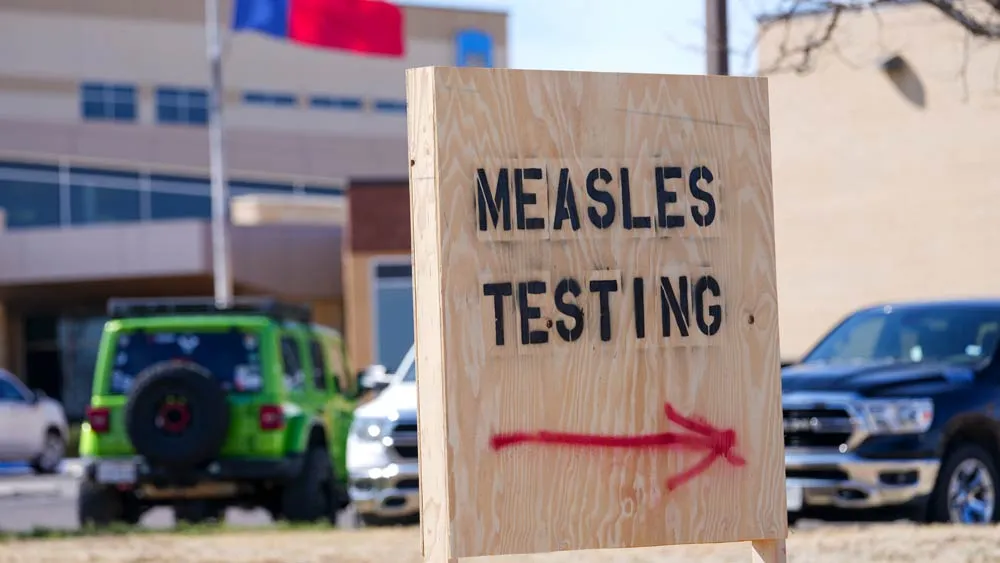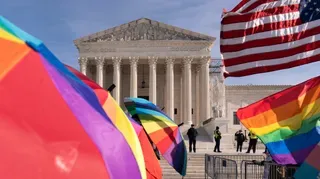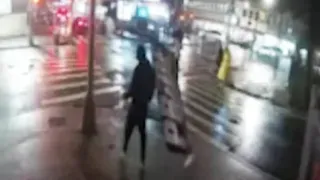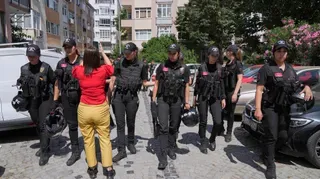March 8, 2012
Condoms Now Required for Los Angeles Porn Actors
Jason St. Amand READ TIME: 4 MIN.
Actors in many of the adult films made in the nation's porn capital must use condoms under a law that took effect Monday, but the prophylactic police aren't yet on the case.
How they will enforce such a regulation once they do begin enforcement is anyone's guess.
In Los Angeles, where an estimated 90 percent of the country's porn films are made, city officials and industry leaders are trying to settle on a way to ensure that there's more safe sex on the set. Some say health care professionals should be present during a shoot to make sure actors use condoms.
"Today really is a milestone in the advance of health and safety for these adult filmmakers," said Ged Kenslea, spokesman for the AIDS Healthcare Foundation, which lobbied for years for the measure.
When the City Council passed the law in January, it gave police, the city attorney, the porn industry and others six months to recommend the best way to enforce the measure. They have roughly four months left.
Until then, it's unclear whether police or health officials will start showing up at shoots. On Monday, city attorney spokesman Frank Mateljan said he didn't know the status of enforcement.
To shoot a movie outside of a studio, the law requires a film permit and condom use. The larger porn companies that make the movies on studio soundstages don't need permits and therefore are exempt from the condom requirement. The companies, however, would need one if they went to a house in a neighborhood to shoot a scene.
The question is whether smaller companies, in which only a handful of people show up at a house, usually in the city's San Fernando Valley, quickly make a movie in a day or two and then move on, will pay any attention.
The head of one of the industry's largest filmmakers said he hadn't been approached about working out how the ordinance would work and how the city would deal with violators.
"We assumed we would be approached but we have not been," said Steven Hirsch, chief executive and co-founder of the Vivid Entertainment Group. Hirsch said about 90 percent of Vivid's film shoots are conducted either in its own studio or outside the city.
But he quickly added that his company would immediately begin complying with the law and require that actors use condoms on any film shoots taking place outside a studio in Los Angeles.
Kenslea, the spokesman for the AIDS health care group, said he's heard that, although as many 50,000 porn films a year are made in Los Angeles, only about 200 permits a month are issued by the city to film them.
"Just because they don't take out permits does not mean there shouldn't be regulations," he said.
Industry officials say the law isn't needed and that their audiences find the use of condoms a turnoff. They said the industry's own requirement, that actors be tested for sexually transmitted diseases every 30 days, is sufficient. Hirsch and others have pointed out that there hasn't been a case of HIV linked directly to the making of a porn film since 2004.
Kenslea and other advocates of using condoms say there have been nine reported cases of HIV involving porn actors since 2004. They said those cases highlight the ever-present risk that someone can acquire the virus in their private life and then infect others on set.
When it comes to enforcement, Kenslea said, his organization is pushing for the city to use health care professionals, perhaps from a nursing agency, to conduct spot checks. The cost of the inspections would be paid out of fees the filmmakers would pay when applying for permits. The foundation has proposed a fee of $50 to $75.
Filmmakers who are caught violating the requirement would be refused future permits.
Meanwhile, his group is trying to get a measure on the November ballot that would require that Los Angeles County adopt a similar but tougher measure mandating a health permit similar to the ones for nail and hair salons. Such an ordinance would cover more than 80 other cities that fall within the county.
Some have threatened to leave the city, taking what they say is an $8 billion-a-year business.
Kenslea dismissed that as a "hollow threat."
"The industry is too entrenched here," he said, noting that Vivid, Larry Flynt and other prominent filmmakers are all based in the city and so are the industry's actors and behind-the-scenes people.
If any do leave, he said, his organization will follow them and push for similar legislation in those new communities. In the case of one city, his organization won't have to.
The mayor of Simi Valley, located about a 10-minute drive from the west San Fernando Valley, where most of the films are made, has proposed an even tougher ordinance than the one in Los Angeles. It is expected to come up for a vote of the City Council within a few weeks.
That law would require that a licensed health care professional be on any porn set to ensure condoms are being used and that the filmmakers turn over an unedited copy of their movie so authorities can see if condoms were used.
"The primary purpose here is it's a health and safety issue. And secondarily, we don't want them here," Mayor Bob Huber said of his city of 125,000 residents. "This is a family-oriented community and we don't want them setting up their studios in Simi Valley."







